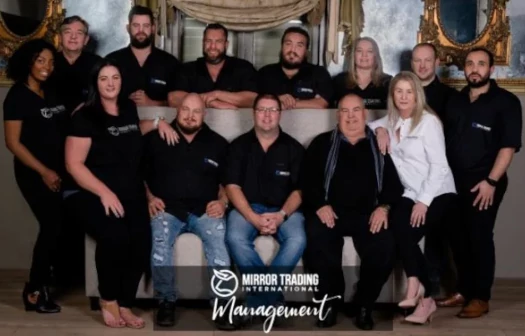Mirror Trading International ruled a Ponzi scheme in SA
 As part of civil liquidation proceedings, the High Court of South Africa has ruled Mirror Trading International was a Ponzi scheme.
As part of civil liquidation proceedings, the High Court of South Africa has ruled Mirror Trading International was a Ponzi scheme.
The court’s undated order follows an application by MTI’s liquidators, seeking orders confirming
- Mirror Trading International was an illegal scheme;
- the investment contract between Mirror Trading International and its investors was illegal;
- Mirror Trading International was insolvent from August 2019 till its collapse in December 2020;
- that payments made by Mirror Trading International as part of its operation were “dispositions without value”;
- that payments made by Mirror Trading International as part of its operation “preferr(ed) one or more of MTI’s creditors [net-winners] above others”
- that as a result of points 4 and 5, MTI’s liquidators are “entitled to recover” payments made by Mirror Trading International as part of its operation; and
- legal costs
On whether Mirror Trading International generated external revenue via trading, as part of the Ponzi ruse, the court found;
Steynberg did not use an artificial intelligence bot to achieve the alleged incredible trading results and that he did not transfer bitcoin deposited by investors held in a pooled account at FXChoice to an unregulated broker named Trade 300.
It follows that the representations made by Steynberg and the management of MTI in this regard were false.
On whether Mirror Trading International operated illegally and unlawfully, the court found it was based on MTI committing securities fraud and running a pyramid scheme.
MTI … breached several statutory provisions … in that it rendered financial services without a license.
On the conspectus of evidence, it cannot seriously be argued that MTI did not conduct a pyramid scheme … if one considers the evidence of Steynberg himself, the binary structure explained by (Cheri) Ward … (Clynton) Marks’ explanations at board meetings … and the evidence of Ignatius Bell who, save for an investment of R7,000 on his behalf by Steynberg, made no further investment but recruited investors and had approximately 190,000 investors in his downline.
Based on the MTI compensation plan, dependent on the investors recruited by Bell, he was enabled to earn an income of R6 million per month.
Following on from that, transactions within MTI were ruled unlawful because
the business conducted by MTI contravened provisions of several statutes … and it appears on the facts which cannot be denied by the respondents that the underlying business model was designed and implemented to perpetrate a fraud on members of the public … which ultimately enabled its directors, shareholders and/or senior management, to misappropriate investor’s assets for their personal gain.
Based on a dispute on whether MTI’s records were accurate and complete, MTI’s liquidators were denied declaratory relief on whether the Ponzi scheme was insolvent as per South Africa’s Insolvency Act.
Permission to recover funds from MTI’s net-winners was also denied, on the basis they might not have known MTI was a Ponzi scheme.
In conclusion, High Court Judge A De Wet ruled;
MTI’s business clearly amounted to an unlawful Ponzi scheme, i.e. a fraudulent investment scam promising high rates of return to investors and generating returns for earlier investors with investments taken from later investors.
It would appear that there is no pool of member’s bitcoin, Trade 300 does not exist, the artificial intelligence bot never existed or traded and the remarkable trading results presented to investors were prima facie false.
All agreements concluded between MTI and its investors in respect of the trading/management/investment of bitcoin for the purported benefit of the investors, are declared unlawful and void ab initio.
Legal costs were additionally awarded.
Looking forward, the question now is what the High Court’s ruling means with respect to ongoing liquidation proceedings.
 MTI’s liquidators should be able to steamroll Clynton and Cheri Marks (right), and the rest of MTI’s net-winners for recovery – but given that wasn’t explicitly granted in the order – doesn’t appear to be the case.
MTI’s liquidators should be able to steamroll Clynton and Cheri Marks (right), and the rest of MTI’s net-winners for recovery – but given that wasn’t explicitly granted in the order – doesn’t appear to be the case.
I’ve been highly critical of MTI going into liquidation, and remain so until something other than liquidators lining their pockets transpires.
Whether the High Court’s ruling is enough to get the FSCA and Hawks (South Africa’s FBI equivalent), to actually do anything is another open question.
Whether intentionally or not, High Court Judge A De Wet has done the work and handed the FSCA and Hawks a criminal case on a platter.

Someone at either agency just has to file the paperwork to get the ball rolling. The FSCA is akin to the SEC, in that they’d rely on the Hawks to pursue criminal charges.
Meanwhile MTI’s suspected owners and primary beneficiaries, Clynton and Cheri Marks, continue to live openly in South Africa.
 Top net-winners like Ignatius Bell (right) have also had no charges filed against them.
Top net-winners like Ignatius Bell (right) have also had no charges filed against them.
That’s despite Bell and others stealing millions of dollars through a now court-certified “illegal and unlawful” Ponzi scheme.
Action from South African authorities on this becomes even more critical, upon consideration liquidators have been neutered with respect to net-winner recovery.
Over in the US the CFTC recently secured a $3.7 billion default judgment against Johan Steynberg (right).
Arresting MTI’s South African ringleaders and recovering what they stole would go a long way to satisfying that judgment – with the aim of ultimately returning stolen funds to MTI’s victims.
Update 26th August 2023 – The High Court has denied an appeal by Clynton Marks against its “MTI was an illegal and unlawful scheme” order.


How on earth can the Marks’s get away with this!? They are criminals as much as Johann Steynberg is!
South Africa is one of the most corrupt countries in the world. Doesn’t take much from the Marks Crime family to bride officials!
Cheri and Clynton know they will never spend a minute in jail. They can comfortably continue to pile the kilograms on, with expensive meals.
Lost R200 000.